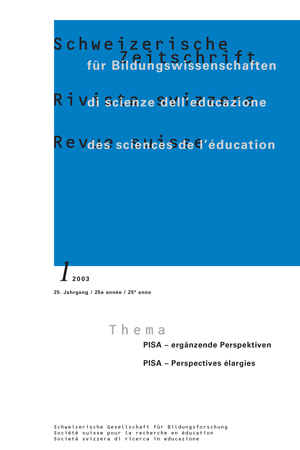Origin, achievement and equal opportunity education in a multi type school system. A detailed examination of the PISA report taking into consideration basic cognitive competence.
DOI:
https://doi.org/10.24452/sjer.25.1.4646Abstract
A consequence of last year’s disappointing Swiss PISA results has been the revival of the discussion of equity in our education system. This article seeks to examine in detail aspects of equal opportunities whilst making allowance for basic cognitive competence. It is evident that pupils’ academic achievement is influenced both by their socio-economic background and the features of their school. This analysis is based on data compiled from 2054 students in the Cantons of Berne and St. Gallen who, in addition to the PISA tests, were tested in their basic cognitive competence. The results demonstrate that academic achievement is strongly influenced by socio-economic background even when taking into consideration the influence of basic cognitive competencies. The most influential factor is the type of school or track a pupil attends. Attendance at a particular type of schools is not only linked to academic achievement but also, to a very large extent, to a pupil’s socio-economic background. Furthermore, the opportunities for learning in an individual school are also influenced by the socio-cultural backgrounds of the pupils attending that school. However, when the analysis takes into consideration pupils’ individual characteristics and the type of school, the differences between schools are much weaker than suggested in the international PISA report (OECD, 2001) which was based on gross-effects only.
Downloads
Downloads
Published
Issue
Section
License
Copyright (c) 2003 Erich Ramseier, Christian Brühwiler

This work is licensed under a Creative Commons Attribution 4.0 International License.



